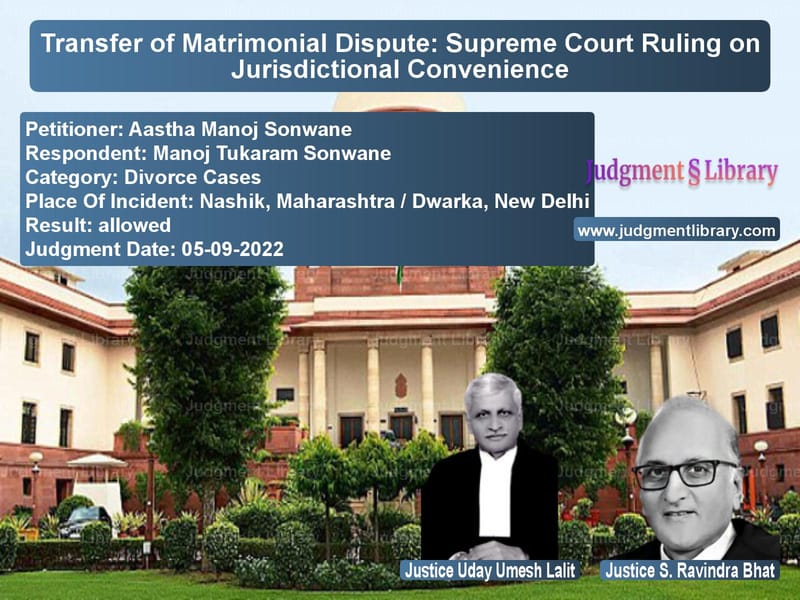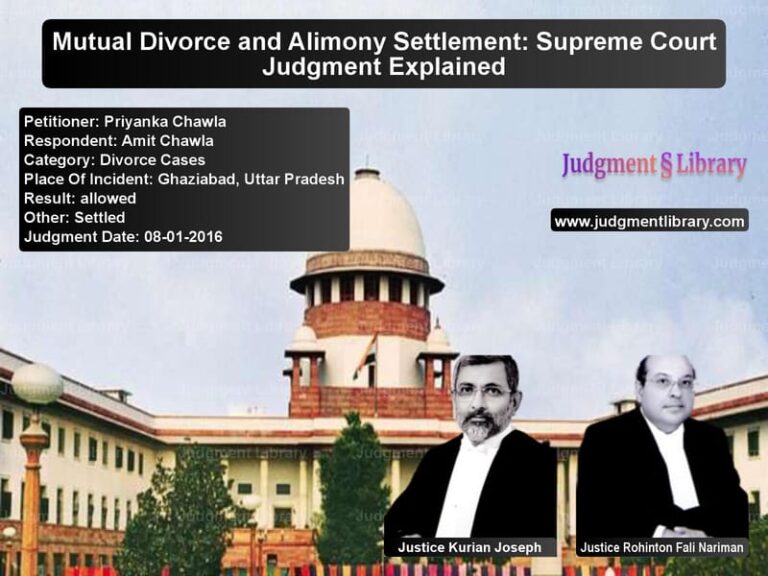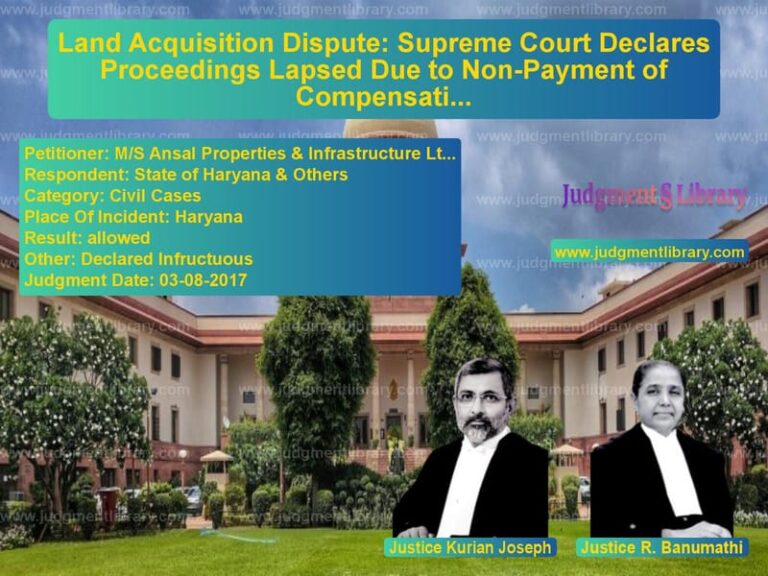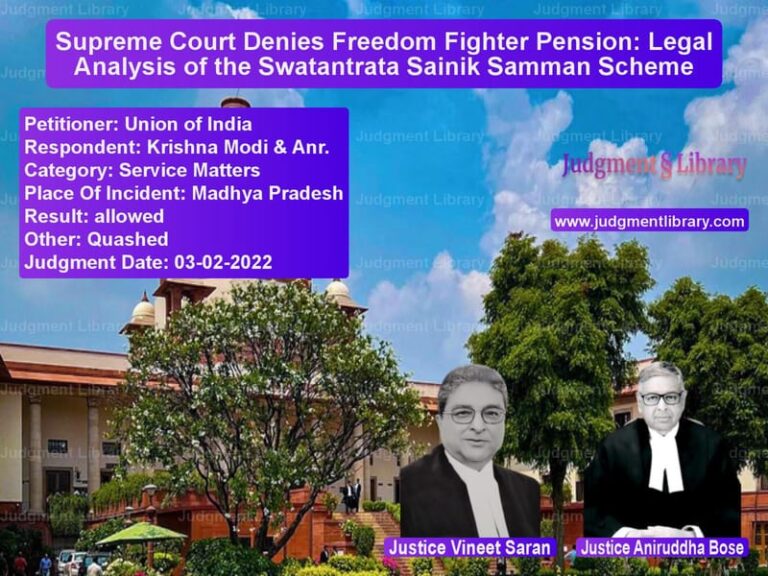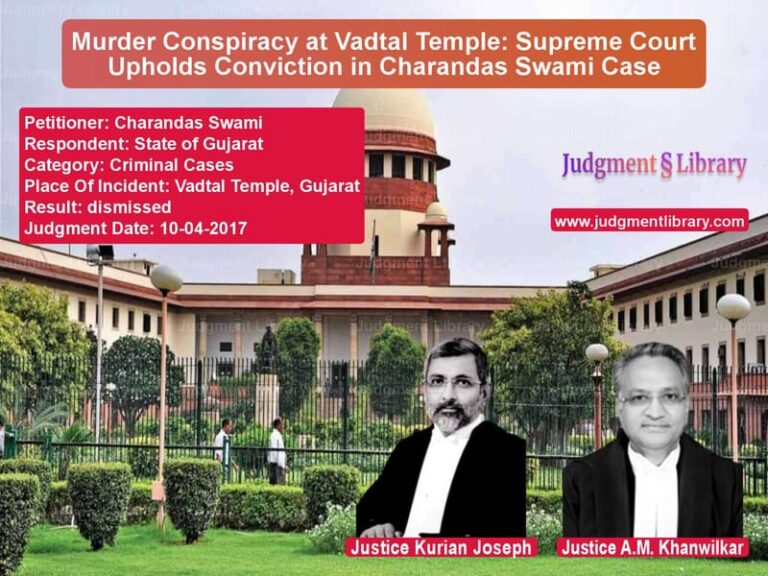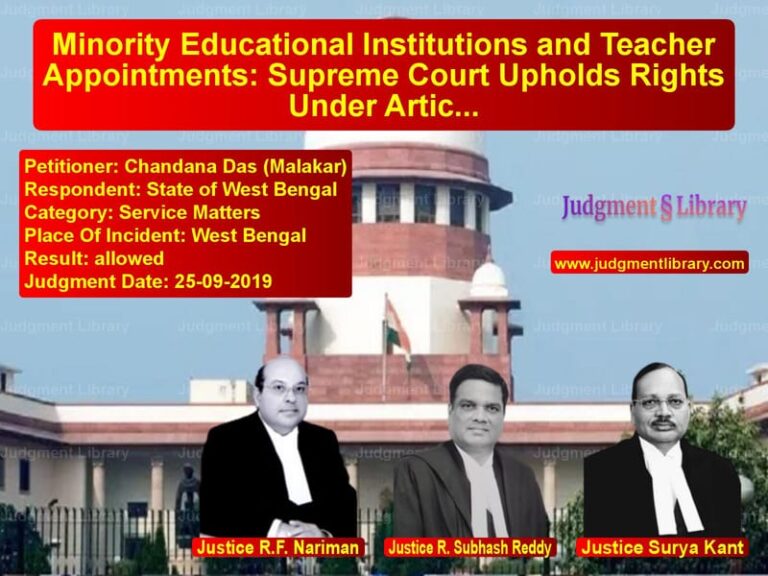Transfer of Matrimonial Dispute: Supreme Court Ruling on Jurisdictional Convenience
The Supreme Court recently ruled on a transfer petition filed by Aastha Manoj Sonwane, seeking to transfer her matrimonial case from Nashik, Maharashtra, to Dwarka, New Delhi. The case involves proceedings filed under Section 9 of the Hindu Marriage Act, 1955, by the respondent-husband, Manoj Tukaram Sonwane, in the Family Court at Nashik Road. The petitioner argued that the distance between Nashik and her place of residence in Delhi made it difficult for her to attend hearings, and thus, she sought the transfer of the case to a more convenient jurisdiction. The Supreme Court issued an interim order staying the proceedings in Nashik and, after considering the facts, granted the transfer of the case to Dwarka, New Delhi.
This judgment highlights the Court’s approach to balancing the convenience of the parties with the principles of justice. The decision also underscores the importance of considering the emotional and financial burdens on parties in matrimonial disputes, where access to the court should not be hindered by geographical constraints.
Background of the Dispute
The dispute between Aastha Manoj Sonwane and Manoj Tukaram Sonwane pertains to proceedings filed under Section 9 of the Hindu Marriage Act, 1955, which involves the restitution of conjugal rights. The respondent-husband initiated the case in the Family Court at Nashik Road, Maharashtra, in 2020. However, the petitioner-wife resides in Dwarka, New Delhi, and traveling to Nashik for hearings created significant logistical and financial difficulties. Given the ongoing nature of the case and the petitioner’s request for a more accessible forum, the petitioner filed a transfer petition before the Supreme Court seeking to move the case to the Family Court at Dwarka, New Delhi.
The respondent did not object to the transfer petition, and the Court issued an interim order in September 2021, staying the proceedings at the Family Court in Nashik while the petition was pending.
Petitioner’s Arguments
The petitioner’s counsel argued that the petitioner had been residing in Dwarka, New Delhi, and attending hearings in Nashik, Maharashtra, imposed an undue burden on her. The counsel emphasized that the petitioner faced considerable hardship, both emotionally and financially, as the distance between her residence and the Family Court in Nashik was significant. Furthermore, the petitioner’s counsel contended that the ongoing proceedings in Nashik were hindering the petitioner’s ability to participate in the case meaningfully, which was detrimental to her rights in the matrimonial dispute.
The petitioner’s counsel cited the principles of convenience and accessibility, stating that the convenience of the parties should be a key factor in deciding the jurisdiction of matrimonial disputes. The counsel also emphasized that the petitioner was willing to participate in proceedings in Dwarka and that the transfer would not prejudice the respondent in any way, as the respondent could attend the hearings in Dwarka, New Delhi. Additionally, the petitioner’s counsel argued that the distance from Nashik to Delhi made it challenging for the petitioner to attend hearings, and such circumstances justified the transfer of the case.
Respondent’s Arguments
The respondent, Manoj Tukaram Sonwane, did not contest the transfer petition, and no objections were raised against the move. Given that the respondent was not actively opposing the petitioner’s request for the transfer, the matter proceeded based on the petitioner’s arguments.
Court’s Reasoning
The Supreme Court carefully examined the facts of the case and the arguments presented by the petitioner. The Court noted that the petitioner had valid reasons for requesting the transfer, as attending hearings in Nashik created significant logistical difficulties due to the distance involved. The Court recognized that the convenience of the parties is an important consideration when deciding the transfer of a case under Section 25 of the Civil Procedure Code.
The Court also noted that the respondent had not raised any objections to the transfer and emphasized that the principles of justice must be balanced with the convenience of the parties. In matrimonial disputes, where parties may already be experiencing emotional distress, ensuring that they can participate fully in proceedings without facing undue hardship is an important consideration.
The Court referred to previous judgments where the convenience of the parties had been taken into account when considering the transfer of cases. The Court noted that while the primary principle in deciding whether to transfer a case is the interest of justice, the convenience of the parties should not be disregarded when it is reasonable to accommodate such requests.
Judgment
The Supreme Court allowed the transfer petition filed by Aastha Manoj Sonwane. The Court directed that the proceedings pending under Section 9 of the Hindu Marriage Act, 1955, in the Family Court at Nashik Road, Maharashtra, be transferred to the Family Court at Dwarka, New Delhi. The Court instructed the Family Court at Nashik to send the entire record of the case to the transferee court without delay.
The Court also directed that the Family Court at Dwarka explore the possibility of settlement between the parties through the process of mediation, in line with the Court’s preference for amicable resolutions in matrimonial disputes. The Court directed the Registry to send a copy of the order to both Family Courts to ensure compliance with the directions.
Conclusion
The Supreme Court’s decision in this case highlights the importance of ensuring that parties in matrimonial disputes are able to attend court hearings without facing undue hardship, particularly when they are dealing with emotionally and financially draining situations. By allowing the transfer of the case to a more convenient jurisdiction, the Court demonstrated a flexible and just approach to the convenience of the parties involved.
This judgment also reflects the Court’s broader approach to family law disputes, where the focus is not only on the legal rights of the parties but also on ensuring that the legal process is accessible and fair. The decision sets a precedent for future cases where the parties face difficulties in attending hearings due to geographical distance or other practical constraints, ensuring that the legal system remains responsive to the needs of those it serves.
Petitioner Name: Aastha Manoj Sonwane.Respondent Name: Manoj Tukaram Sonwane.Judgment By: Justice Uday Umesh Lalit, Justice S. Ravindra Bhat.Place Of Incident: Nashik, Maharashtra / Dwarka, New Delhi.Judgment Date: 05-09-2022.
Don’t miss out on the full details! Download the complete judgment in PDF format below and gain valuable insights instantly!
Download Judgment: aastha-manoj-sonwane-vs-manoj-tukaram-sonwan-supreme-court-of-india-judgment-dated-05-09-2022.pdf
Directly Download Judgment: Directly download this Judgment
See all petitions in Mutual Consent Divorce
See all petitions in Alimony and Maintenance
See all petitions in Child Custody
See all petitions in Property Division in Divorce Cases
See all petitions in Dowry Cases
See all petitions in Judgment by Uday Umesh Lalit
See all petitions in Judgment by S Ravindra Bhat
See all petitions in allowed
See all petitions in supreme court of India judgments September 2022
See all petitions in 2022 judgments
See all posts in Divorce Cases Category
See all allowed petitions in Divorce Cases Category
See all Dismissed petitions in Divorce Cases Category
See all partially allowed petitions in Divorce Cases Category

